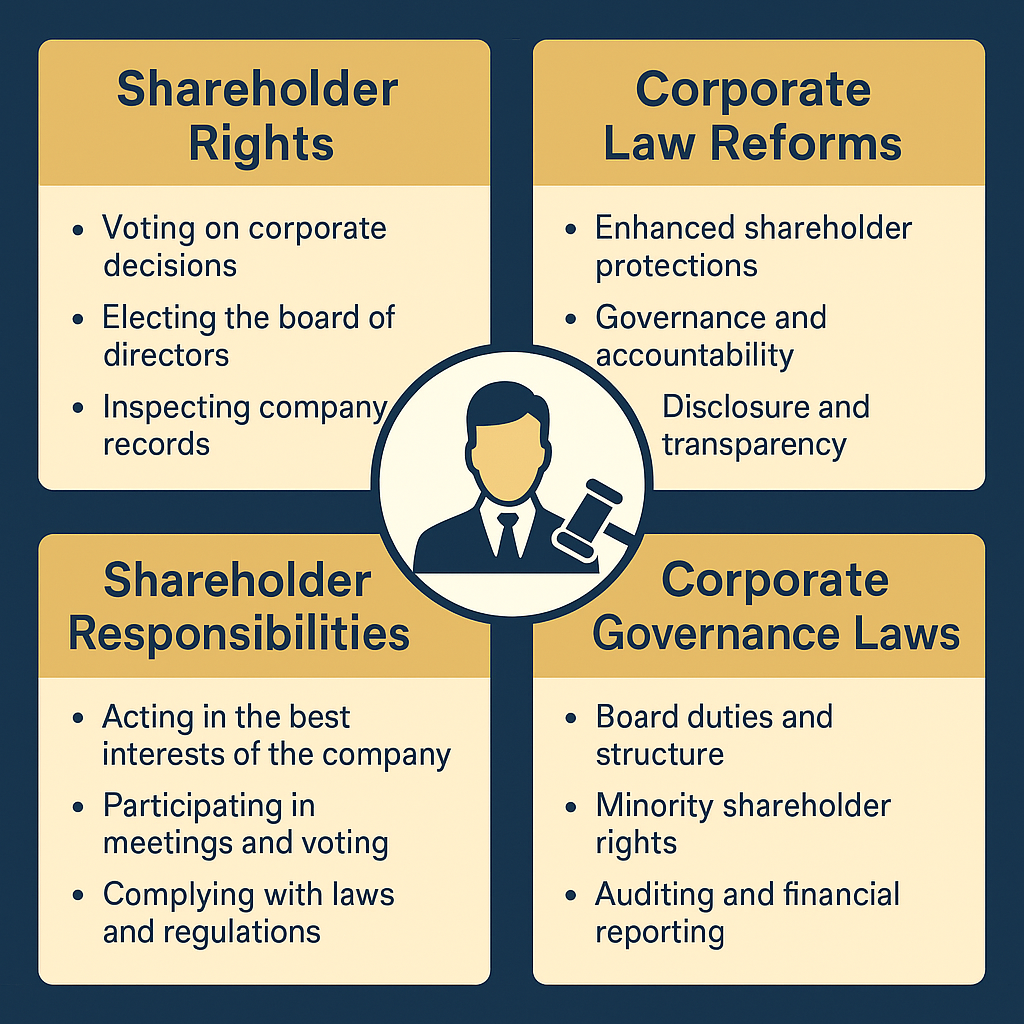Through synergistic adjustments to its commercial structures, the global corporate environment is now governed by corporate law reforms 2025, which reshape shareholder legislative rights. British businesses operating during the tech-based recovery period have created a need for essential regulatory updates regarding corporate governance standards and investor protection while maintaining transparency standards.
A comprehensive research examines the new corporate law adjustments from 2025 while comparing India with the United States, thereby analyzing changes to shareholder defense regulations and shareholder duties plus corporate operational accountability standards.
Understanding the Need for Corporate Law Reforms 2025
Both developed and emerging economies recognize the importance of urgent action to update outdated statutes due to corporate frauds and shareholder activism, together with ESG concerns. The 2025 corporate law reforms handle important matters, including:
- Boardroom accountability
- Investor participation in governance
- Disclosure standards and financial integrity
- Minority shareholder protection laws
- Environmental, Social, and Governance (ESG) Obligations
The regulatory changes aim to control business enterprises and strengthen shareholder power through equitable legal channels that benefit shareholders regardless of their shareholding size.
Key Corporate Law Reforms 2025: India and U.S. Compared
India’s Corporate Law Reforms
Under corporate law reform 2025, India made extensive adjustments to its laws at both the national and company levels. Substantial changes to the Companies Act, 2013, along with SEBI (Listing Obligations and Disclosure Requirements) and ESG-focused policies, have greatly affected shareholder rights.
Key Highlights:
- Mandatory e-voting for companies with 500+ shareholders.
- Companies need to meet specific new requirements for filing class-action litigation.
- Stricter disclosures on related-party transactions.
- Enhanced board independence and audit oversight.
The new policies build on shareholder protection laws through legal clarification of investor responsibilities that applies mainly to institutional investors who must act actively within governance structures.
US Corporate Law Updates
Current Securities and Exchange Commission (SEC) updates and individual state law reforms in Delaware focus on investor needs through advanced legislation. Key reform areas include:
- Companies should grant better rights to proxy holders and voting individuals.
- The SEC imposes mandatory ESG disclosure through its new regulations.
- Executive compensation transparency.
- Corporate diversity disclosure on boards.
American corporate laws adjust their regulations to safeguard shareholder rights while implementing accountability mechanisms for executive staff as well as directors.
Strengthening Shareholder Rights through Corporate Law Reforms 2025
Shareholder powers have evolved to function actively as items that maintain director and executive responsibility under current corporate governance standards. The corporate law reforms 2025 enhance these measures through the following changes:
Facilitating Digital Voting
The goal of electronic voting practices includes implementing blockchain technology alongside SEBI-mandated e-voting systems to safeguard integrity while providing easily accessible shareholder rights.
Enhancing Class-Action Mechanisms
The modern legal threshold for shareholder rights of protection enables minority investors to take legal measures against corporate mismanagement or oppression, thus advancing shareholder law.
Access to Real-Time Disclosures
Shareholders can make better decisions through existing regulatory requirements that demand instant financial and ESG disclosure reporting.
Inclusive Board Structures
Boards of directors in both India and the United States become more effective through gender and skills diversity requirements, which support both countries’ corporate governance regulations.
Corporate Law Reforms 2025: Evolving Legal Responsibilities of Shareholders
Corporate law reforms 2025 increase investor authority at the same time they establish stronger requirements of accountability. Shareholders now need to fulfill several active legal duties that extend beyond simply presiding over Annual General Meetings or voting for directors. Modern shareholders must:
- Every shareholder should verify knowledge about the governance approaches of companies they support.
- Participate in ESG evaluations.
- Shareholders must stay away from insider trading deals and all forms of collusive misconduct.
- Monitor compliance and report misconduct.
The recognition within both jurisdictions exists that corporate governance requires shareholders to embrace both rights and responsibilities as interconnected components for sustainable practices.

Expert and Legal Commentary on Recent Cases
The changes brought by the corporate law reforms 2025 have triggered both legislative changes in statutes and increased judicial case interpretation and expert opinions.
Case 1: The Indian Tech Giant Data Breach (2024)
A top Indian IT corporation discovered itself in the middle of a breach incident that occurred during late 2024. The previous legal statutes protected minority shareholders from strong means to review the decisions made by their board members. With the implementation of new corporate law reforms in 2025, lawmakers enabled the filing of class-action lawsuits according to updated Companies Act provisions and SEBI regulations. Adv. Radhika Mehta, who serves as a corporate governance consultant, stated:
“This case set a strong precedent. The court’s willingness to admit a class-action suit based on investor data privacy showed how shareholder rights now extend into the digital realm. The legal responsibilities of shareholders include holding companies accountable for data ethics, not just financial returns.”
The regulatory response to this case led them to enhance their compliance requirements that integrated cybersecurity into board-level risk assessment, which received backing from updated corporate governance legislation.
Case 2: U.S. Environmental Violation and Shareholder Pushback
The major U.S. agribusiness faced a 2024 lawsuit from institutional investors due to unmet carbon neutrality requirements. Under new regulations of the US corporate law, they activated shareholder power to suggest the removal of three board members at the annual general meeting (AGM). Professor Michael Greene, a corporate law expert at NYU, commented:
“The ability to vote out directors over ESG failures would have been unthinkable a decade ago. The US corporate law updates now empower even pension funds and retail investors to act decisively through proxy mechanisms. This speaks volumes about the maturing landscape of shareholder protection laws.”
The case demonstrates how shareholder obligations towards actively reviewing sustainability statements have grown stronger, especially for institutions, according to his analysis.
Comparative Takeaways
The research published by the Indian Institute of Corporate Affairs (IICA) demonstrates that Indian corporate governance laws approach U.S. standards in their development. However, enforcement remains a hurdle.
U.S. legal experts commend the rapid ESG-related shareholder litigation adaptation abilities of the Chancery Court in Delaware. US corporate law updates demonstrate effective legal efficiency, which stands as one of their major advantages, according to legal experts.
Legal Community Response
The reforms received positive feedback from members of bar associations and think tanks, although officials expressed concern about regulatory constraints. The corporate law reforms 2025 contain well-meant measures that introduce substantial compliance requirements. Multiple legal practices throughout both nations supply “shareholder advocacy services” which guide investors through changing regulatory frameworks together with shareholder legal commitments.
The development of shareholder protection laws requires investors to gain basic legal knowledge. Shareholders adopted a position of corporate watchdogs to oversee corporate activities through voting on mergers and helping prevent mismanagement as well as promoting diversity mandates.
Emerging Trends in Corporate Law Reforms 2025 (2025–2030)
The corporate law reforms of 2025 will initiate multiple changes in the future. Potential modifications within the next five years will bring forth the following developments:
- AI tools will monitor director performance and detect ESG risks in addition to uncovering irregularities in board member conduct.
- The already implemented blockchain system for some U.S. states now allows shareholders to vote using blockchain technology that provides tamper-proof transparency in the voting process.
- The demand for international investor consistency will motivate India and the U.S. to establish finance frameworks that comply with OECD or IFRS guidelines.
The implemented trends work to make shareholder rights more powerful through reduced court cases and administrative requirements.
Challenges and Compliance Risks due to Corporate Law Reforms 2025
The well-meaning aspects of corporate law reforms 2025 face resistance due to implementation complications.
- The majority of retail investors, including those in India, lack information about their protection rights as specified by current shareholder law changes.
- Companies claim that stringent compliance requirements, particularly related to ESG, create barriers to business creativity.
- Different regulatory bodies at federal and state levels in the U.S. cause inconsistencies when corporations follow corporate governance laws.
Active collaboration among regulators and corporates, and shareholders must exist to overcome such challenges as each party needs to fulfill their legal responsibilities to shareholders and directors.
Practical Tips for Shareholders in 2025
Both retail and institutional shareholders need to adopt the following steps to negotiate recent legal changes:
Regularly Review Updates
Maintain a continual information flow about modifications in legislation related to US corporate law and Indian regulation systems.
Understand Voting Rights
Voters need to understand proper voting procedure for making decisions on critical matters, including board member selection and ESG proposals and mergers acquisitions.
Engage Through Associations
Shareholders should become members of both shareholder forums and investor protection groups to help build their advocacy power.
Consult Legal Experts
State-wide corporate governance laws require large or complex holdings to use legal counsel for interpretation and duty compliance.
Conclusion
The corporate law reforms 2025 create a fundamental change to international corporate governance standards. These reforms establish a brighter business future that serves shareholders better by enabling stronger rights and making corporate governance more strict, as well as redefining shareholder legal obligations.
India alongside the United States are currently experiencing legal transformation that prioritizes shareholders throughout corporate choices. The importance of shareholder protection laws reaches its peak because ESG-centric frameworks, digital compliance tools, and investor-led activism exist at this present time.
Shareholders hold a critical role in a global economy thus, they face an opportunity to enhance their expanded powers through responsible conduct to benefit the remote growth of corporate organizations. Both the recent US corporate law reforms and changes in India’s legal framework serve as mandates to every investor, no matter their size, to act responsibly.
FAQs for Corporate Law Reforms 2025
- 1. What are the major corporate law reforms 2025 introduced globally?
The corporate law reforms 2025 focus on improving transparency, enhancing board accountability, and strengthening shareholder protection laws across jurisdictions like the U.S. and India.
- 2. How do corporate law reforms affect shareholder rights?
The reforms significantly expand shareholder rights, allowing investors more power in decision-making, voting, and initiating legal actions for corporate misconduct.
- 3. What changes have been made in US corporate law updates regarding shareholders?
US corporate law updates now include enhanced disclosure requirements, ESG-related voting rights, and stronger mechanisms for enforcing corporate governance laws.
- 4. What are the legal responsibilities of shareholders under new reforms?
The legal responsibilities of shareholders include active participation in governance, voting on key issues, and holding companies accountable under corporate governance laws.
- 5. How do shareholder protection laws work in India after 2025 reforms?
Post-corporate law reforms 2025, India has empowered minority investors through stronger shareholder protection laws, including class-action rights and improved board oversight.




Pingback: Constitutional Law in India | Key Concepts & Case Laws
The next time I read a blog, I hope that it doesnt disappoint me as much as this one. I mean, I know it was my choice to read, but I actually thought youd have something interesting to say. All I hear is a bunch of whining about something that you could fix if you werent too busy looking for attention.
Hmm it seems like your site ate my first comment (it was extremely long) so I guess I’ll just sum it up what I had written and say, I’m thoroughly enjoying your blog. I too am an aspiring blog blogger but I’m still new to everything. Do you have any suggestions for novice blog writers? I’d genuinely appreciate it.
Very efficiently written article. It will be valuable to everyone who employess it, as well as yours truly :). Keep up the good work – i will definitely read more posts.
Perfectly written content material, Really enjoyed reading.
Pingback: Corporate Governance New Formula For Secure Growth